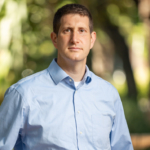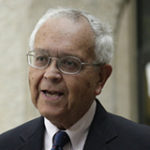SLS Faculty Weigh In on Recent SCOTUS Decisions in Roundup of the 2022-2023 Term
In this annual roundup, we offer highlights of the commentary and insight that Stanford Law School faculty members provided on key SCOTUS decisions during this year’s term (beginning October 2022).
Biden v. Nebraska, Decided June 30, 2023

Stanford’s Bernadette Meyler on SCOTUS’ Student Loan Forgiveness Decision
Biden v. Nebraska, which struck down President Biden’s effort to cancel student loans under the HEROES Act, bears hallmarks of longstanding tendencies of Chief Justice Roberts’ jurisprudence as well as developments since Justices Gorsuch, Kavanaugh, and Barrett joined the Court. Consistent with these approaches, the majority drew a formalistic line between permissible and impermissible modifications of student financial assistance and Justice Barrett also defended a form of common law judging under the guise of textualism. Read more in Legal Aggregate.

Q&A: Senior Fellows John F. Cogan And Michael McConnell On Their New Amicus Brief Opposing The Student Loan Forgiveness Program
(Originally published by the Hoover Institution on February 21, 2023)
In this Q&A, senior fellows John F. Cogan and Michael McConnell discuss the U.S. Supreme Court amicus brief they filed, along with scholars Christopher DeMuth and Peter Wallison, in Biden v. Nebraska, in which Nebraska and a number of states challenge the constitutionality of President Biden’s decision to forgive more than $400 billion worth of federal student loans taken out by 43 million Americans.
Providing relevant historical examples, Cogan and McConnell argue that the Biden administration’s action is an encroachment of Congress’s sole authority over the “power of the purse” (the appropriation of money) as defined by the U.S. Constitution. The scholars contend that the administration has distorted the meaning of the HEROES Act of 2003 to provide the legal justification for student loan forgiveness. Moreover, they explain that the White House itself has acknowledged that the cancellation of this debt will add $400 billion to the federal deficit. Read more in Legal Aggregate.
Students for Fair Admissions v. Harvard, Decided June 30, 2023

Stanford’s Rick Banks on Race-Based College Admissions SCOTUS Decision
On Thursday, June 29, the U.S. Supreme Court struck down race-based affirmative action admissions plans at Harvard University and the University of North Carolina. While the Court has previously upheld affirmative action, most prominently 20 years ago when Justice Sandra Day O’Connor wrote the majority opinion for the Grutter decision in the University of Michigan cases, today’s 6-3 ruling that colleges and universities must stop considering race in admissions is representative of a decisive shift to the right in the Court’s makeup. The decision says plainly: “Many universities have for too long wrongly concluded that the touchstone of an individual’s identity is not challenges bested, skills built, or lessons learned, but the color of their skin. This Nation’s constitutional history does not tolerate that choice.” Here, Professor Ralph Richard Banks, a law school faculty member who directs the Stanford Center for Racial Justice, discusses the ruling, issues the Court did not take into consideration, and how schools might address diversity in light of the Court’s ruling.
What is your initial reaction to the decision?
Frankly, from what I read, there was nothing new in the majority argument. There have been contradictions, instabilities, and vulnerabilities in the doctrine and practice around affirmative action for a long time. The Court has just shifted in how it evaluates those questions. It has applied a much more stringent form of scrutiny in this case than it has in the past. Read more in Legal Aggregate.
The Supreme Court’s Segregationists by Professor Richard Thompson Ford

(Originally published by The Chronicle of Higher Education on July 10, 2023)
On cue, the Supreme Court has invalidated race-conscious affirmative action in higher education. The majority opinion was preordained, but the dishonesty and cowardice of that opinion and the concurrences are still breathtaking. It’s especially galling that the court cloaked an attack on integration in the equal-protection clause of the 14th Amendment and the Brown v. Board of Education decision. And make no mistake: Opposition to affirmative action is part of a segregationist agenda that began with opposition to school desegregation in the 1950s and has taken new and more-underhanded forms as evolving public opinion made an open defense of segregation untenable. Read more in Legal Aggregate.
Affirmative Action: Stanford Law School Faculty Analyze the Supreme Court’s Ruling

On June 30, the Stanford Law School faculty held a panel discussion about the Supreme Court’s highly anticipated decision in a pair of cases about affirmative action, Students for Fair Admissions v. University of North Carolina and Students for Fair Admissions v. Presidents & Fellows of Harvard College. They assessed what the opinion means for existing constitutional and civil rights law, as well as for affirmative action policies and diversity in America more broadly. The event was moderated by Ralph Richard Banks, the Jackson Eli Reynolds Professor of Law and Faculty Director of the Stanford Center for Racial Justice, along with the following Stanford Law faculty panelists: Easha Anand, Assistant Professor and Co-Director of the Supreme Court Litigation Clinic; Richard Thompson Ford, George E. Osborne Professor of Law; and Michael McConnell, Richard and Frances Mallery Professor of Law and Director of the Constitutional Law Center. The event was co-sponsored by the Stanford Center for Racial Justice and the Stanford Constitutional Law Center. Watch the program here.
Could the Supreme Court’s Decision to Strike Down Affirmative Action Affect Workplace Diversity?
(KQED radio program including commentary from Richard Thompson Ford)
When the U.S. Supreme Court struck down affirmative action last month, its ruling was focused on college admissions. But some legal experts say that, in practice, the ruling could also discourage diversity efforts by employers. Many workplaces instituted diversity, equity and inclusion (DEI) practices following the murder of George Floyd in 2020. But three years later, those policies are facing scrutiny from conservative legal groups — whom experts say may now be emboldened by the court’s ruling. We’ll talk about the role of DEI practices in the workplace, pushback these efforts may face and how it could all affect diversity where you work. Listen to the program here.
Stanford Law School Panel Discusses History and Future of Affirmative Action
On November 14, Stanford Law School (SLS) hosted a one-hour speaker panel, “The Supreme Court and the Future of Affirmative Action,” co-sponsored by the Asian and Pacific Islander Law Students Association and the Stanford Constitutional Law Center. The event was held two weeks after the United States Supreme Court heard oral arguments in a much-watched pair of cases brought against Harvard College and the University of North Carolina by the anti-affirmative action group Students for Fair Admissions. The suits challenge the universities’ race-conscious admissions practices, specifically arguing that the schools’ policies result in discrimination against Asian American applicants. Read more and listen to the discussion here.
303 Creative LLC v. Elenis, Decided June 30, 2023

Professor Michael McConnell (Stanford) on 303 Creative (the Web Site Designer / Same-Sex Wedding Case)
(Originally published by Reason on December 6, 2022)
Much of the commentary on today’s argument in 303 Creative starts from the premise that the case pits free speech (or maybe religious freedom) against LGBTQ rights. The headline in The Economist reads: “A new Supreme Court case may dampen protections for LGBT people.” Anyone listening carefully to the argument will discover that this framing is off the mark. Both sides in the argument were peppered with hypotheticals—some of them bizarre—about other possible scenarios if the Colorado law that has been interpreted to require a web designer to use her talents to celebrate a same-sex wedding is upheld. Or struck down. The hypotheticals involved all manner of speech on one side or the other of questions related to discrimination of one sort or another—religious discrimination, political belief discrimination, pro-LGBT advocacy, and any other messages you can imagine that involve one group favored over another. Read more of the opinion piece in Reason.
Moore v. Harper, Decided June 27, 2023

The United States Supreme Court heard oral arguments on December 7 in what is widely seen as one of the most significant cases in the country’s history to address fundamental questions of federalism. Moore v. Harper asks whether the North Carolina Supreme Court violated the U.S. Constitution when it struck down the state legislature’s gerrymandered congressional map for violating the North Carolina Constitution. More broadly, the case implicates what the Constitution means when it delegates to each state’s legislature the job of regulating congressional elections and the appointment of presidential electors. Read more in Legal Aggregate.
The Supreme Court Has a Perfectly Good Option in Its Most Divisive Case
(Originally published by The Atlantic on October 11, 2022)
Later this term, the Supreme Court will decide Moore v. Harper, a case that has been pitched as a seismic clash between two troubling positions. One side asks for state legislatures to be freed from the traditional safeguards of state constitutional law, while the other asks the Court to effectively ignore the text of the Constitution. The Court should look beyond these unsupportable positions and take a commonsense middle ground. Fortunately, one is readily available: an approach that maintains the Constitution’s emphasis on state legislatures without divorcing them from their traditional constitutional constraints. Read more in Legal Aggregate.
Haaland v. Brackeen, Decided June 15, 2023

Stanford’s Greg Ablavsky on the Brackeen Indian Child Welfare Act Decision
On June 15, the U.S. Supreme Court upheld the Indian Child Welfare Act (ICWA), in Haaland v. Brackeen. Here, Professor Gregory Ablavsky, a legal historian whose scholarship and amicus brief were cited by justices on both sides of the decision—by Justices Gorsuch in his concurring opinion and Justice Thomas in dissent—discusses key points of the decision.
What is at the heart of this decision?
There are so many things that are at the heart of the case. Let’s start with the politics. I think the case reflects both a very long standing attack and critique of tribal sovereignty, what some scholars have called the anti-sovereignty movement, coupled with the culmination of a certain kind of conservative color blindness that views anything that they deem to be a racial classification as anathema. The confluence of those two things in this case has been striking. Read more in Legal Aggregate.
(Originally published by The Slate on June 20, 2023)
When, a decade ago, I was a graduate student toiling away on my dissertation, I could not have imagined that Justice Clarence Thomas would one day devote a lengthy footnote in a Supreme Court opinion to arguing why my obscure historical research was wrong. But that is what happened in the court’s recent decision in Haaland v. Brackeen. By a 7–2 vote, the court upheld the Indian Child Welfare Act (ICWA)—a critical federal law that provides procedural protections for Native children when their parents are unable to care for them—against a long-standing campaign begun by right-wing think tanks to overturn it. Read more in Legal Aggregate.
Jack Daniel’s Properties, Inc. v. VIP Products LLC, Decided June 8, 2023
Juelsgaard Clinic Asks Supreme Court to Protect Free Speech from Trademark Lawsuits

Can a famous brand use trademark lawsuits to chill lawful speech protected by the First Amendment?
Juelsgaard Intellectual Property and Innovation Clinic students Victoria Fang, JD ’24, and Julia Laurence, JD ’24, recently filed an amicus brief urging the Supreme Court to answer “no” to that question and protect free expression. The Clinic submitted the brief on behalf of a group of trademark law professors in the Jack Daniel’s Properties, Inc. v. VIP Products LLC trademark lawsuit between the well-known whiskey distillery and a dog toy manufacturer.
Thirty of the country’s most prominent trademark law professors joined the Clinic’s brief, led by Stanford Law School’s Mark A. Lemley and UCLA School of Law’s Mark P. McKenna. The Clinic worked with the professors to advocate for the orderly development of trademark law in a way that serves the public interest.
At the center of the lawsuit is a parody dog toy called “Bad Spaniels,” which was introduced by VIP Products as part of its “Silly Squeakers” line almost a decade ago. Read more on the Mills Clinic page.
Glacier Northwest, Inc. v. International Brotherhood of Teamsters Local Union No. 174, Decided June 1, 2023

SLS’s William Gould Discusses How Labor Interests ‘Dodged a Bullet’ in Recent SCOTUS Decision
Before the United States Supreme Court handed down its recent 8-to-1 decision in Glacier Northwest v. International Brotherhood of Teamsters Local 174, many labor advocates and labor law experts were steeling themselves for a broad rollback of workers’ right to strike. While the Court did give a narrowly tailored win to the employer in the case—allowing a property damage suit against the striking Teamsters to proceed in state court—“nothing in the decision changes important precedent designed to protect workers,” says William Gould, the Charles A. Beardsley Professor of Law, Emeritus, the former chairman of the National Labor Relations Board (NLRB), and the former chairman of the California Agricultural Relations Board. Read more in Legal Aggregate.
Slack Technologies, LLC v. Pirani, Decided June 1, 2023

Stanford’s Joe Grundfest on Two Major Securities and Corporate Law Decisions
In Slack v. Pirani, a unanimous United States Supreme Court voted in support of the amicus position I advocated with former SEC Chairman Jay Clayton. Plaintiffs alleged violations of Section 11 of the Securities Act of 1933—a provision that is notoriously difficult to defend against because it creates strict liability for the corporate issuer. The Court held that plaintiffs have to demonstrate that the shares they purchased on the open market were issued pursuant to the allegedly defective registration statement, and not any other shares, even if those other shares are perfectly fungible with the registered shares. That burden can be impossible for many plaintiffs to bear and will often cause complaints to be dismissed in their entirety, or reduce potential damage awards. The opinion relies on several points of statutory construction and regulatory interpretation unique to our brief. Read more in Legal Aggregate.
Sackett v. Environmental Protection Agency, Decided May 25, 2023

Stanford’s Deborah Sivas on SCOTUS Decision that Limits EPA Powers
The May 25 U.S. Supreme Court decision Sackett v EPA overturns a decision from the U.S. Court of Appeals’ 9th Circuit, which sided with the EPA in 2021, upended existing practices by limiting the Clean Water Act, with a majority holding that only wetlands that have a continuous surface connection to a river, lake, or other major waterway are covered by the law. Here, environmental law expert Professor Deborah Sivas discusses the decision and possible impacts.
What is the big takeaway from this decision?
As many anticipated, the Sackett decision dramatically shrinks the authority of the U.S. Environmental Protection Agency (EPA) and Army Corps of Engineers to regulate wetlands. Under the Clean Water Act, these agencies have dual regulatory authority to protect “waters of the United States” and “adjacent wetlands.” The Sackett case, like several prior cases before the Court, challenged the definition and scope of Clean Water Act jurisdiction over wetlands adjacent to waters of the United States. Read more in Legal Aggregate.
Twitter, Inc. v. Taamneh and Gonzalez v. Google LLC, Decided May 18, 2023

Stanford’s Daphne Keller on SCOTUS Decision that Google, Twitter, and Facebook not Responsible for Islamic State Deadly Posts
On May 18, the Supreme Court issued a 9-0 ruling in Twitter v. Taamneh and a companion case, Gonzalez v. Google, rejecting efforts to hold Twitter, Google and Facebook culpable for a deadly Islamic State attack discussed on those platforms. Here, Daphne Keller, a lecturer in law at Stanford Law School and director of the Program on Platform Regulation at Stanford’s Cyber Policy Center, discusses the decisions.
What are the key takeaways of the decisions? How important are they?
They are important rulings, and it is also important how sober and straightforward they are. We are seeing so much political theater in Congress right now on the topic of platforms and online speech. These rulings make the Supreme Court look like the grownups in the room. Read more in Legal Aggregate.

Four questions: Evelyn Douek on what Section 230 is and why it is misunderstood
(Originally published by Stanford News on October 7, 2022)
On the docket for the United States Supreme Court this term is Gonzalez v. Google and Twitter v. Taamneh, high-profile cases that may redefine Section 230 of the Communications Decency Act, legislation that protects platforms from what their users say on their websites, and platform liability for hosting terrorist material. Read more in Legal Aggregate.

With the United States Supreme Court hearing oral arguments this week in two major cases involving Internet platform regulation—and two more important platform cases likely on the docket for the fall term—Stanford Law School’s Cyber Policy Center held a February 17 panel to sort out the overlapping, often-contradictory legal and policy considerations at issue in the four cases.
Nate Persily, the James B. McClatchy Professor of Law, served as the moderator for “Judging the Internet: The Supreme Court’s Upcoming Cases On Platform Regulation.” The SLS panelists were Daphne Keller, director of the Program on Platform Regulation at the Cyber Policy Center, and Evelyn Douek, assistant professor of law. They were joined by Yale Law Professor Jack Balkin. Read more and listen to the program here.
National Pork Producers Council v. Ross, Decided on May 11, 2023

(Originally published by Reason on October 11, 2022)
Professor McConnell is one of the top constitutional law scholars in the country, and I was delighted that he passed along this item on National Pork Producers Council v. Ross. (Disclosure: He participated in drafting the U.S. Chamber of Commerce amicus brief in the case, but the views expressed here are his own, not those of the Chamber.) Read more in Legal Aggregate.
Counterman v. Colorado, Decided on April 19, 2023

(Originally published by The Atlantic on April 26, 2023)
A few years ago, Billy Raymond Counterman was convicted of stalking. Now his case is before the Supreme Court—where, bafflingly, the justices spent oral arguments last week exploring how to define a “true threat,” something Counterman was never convicted of making. Threats and stalking are entirely different crimes, with entirely different elements and constitutional implications. If the Court goes ahead and issues a ruling about threats, as it seems poised to do, it could inadvertently weaken stalking laws around the country. A set of imaginary facts could lead to serious real-world harm. Read more in Legal Aggregate.
Additional Analysis

The Supreme Court’s Conservatives Control Even More Than You Realize by Professor Jeffrey L. Fisher
(Originally published by The New York Times on July 12, 2023)
Add this to the ways in which the Supreme Court is increasingly resembling just another political institution: Only one side of the ideological divide has the power to set the institution’s agenda.
This is a little-recognized, but highly significant, feature of the current 6-3 alignment of justices. Under longstanding tradition, it takes four votes to put a case on the court’s docket, the so-called rule of four. Not five, mind you, not a majority. But it does take four. And the Democratic appointees now seem to find themselves one vote short in case after case.
Why does this matter? Read more in Legal Aggregate.

Professor Pam Karlan Participates in Aspen Ideas Festival Panel on Supreme Court
(Originally posted by the Aspen Institute on June 30, 2023)
Professor Pam Karlan, co-director of the Stanford Supreme Court Litigation Clinic, served on a panel titled Supreme Court Review as part of the 2023 Aspen Ideas Festival. The panelists discussed the Court’s rulings and explored what recent ethics controversies might mean for ongoing debates about the Court’s legitimacy. Watch the video here and read more about SLS’s Supreme Court Litigation Clinic cases here.

The Imperial Supreme Court by Professor Mark Lemley
(Originally published by the Harvard Law Review in November 2022)
The past few years have marked the emergence of the imperial Supreme Court. Armed with a new, nearly bulletproof majority, conservative Justices on the Court have embarked on a radical restructuring of American law across a range of fields and disciplines. Unlike previous shifts in the Court, this one isn’t marked by debates over federal versus state power, or congressional versus judicial power, or judicial activism versus restraint. Nor is it marked by the triumph of one form of constitutional interpretation over another. On each of those axes, the Court’s recent opinions point in radically different directions. The Court has taken significant, simultaneous steps to restrict the power of Congress, the administrative state, the states, and the lower federal courts. And it has done so using a variety of (often contradictory) interpretative methodologies. The common denominator across multiple opinions in the last two years is that they concentrate power in one place: the Supreme Court.
My goal in this essay is not to criticize these decisions on the merits, though there is much to criticize; lots of others will do that. Nor do I aim simply to make the legal realist point that the Justices will do what they want in the cases before them, though the last few Terms provide ample evidence for that claim too. Rather, my argument is that the Court has begun to implement the policy preferences of its conservative majority in a new and troubling way: by simultaneously stripping power from every political entity except the Supreme Court itself. Read more in the Harvard Law Review.
